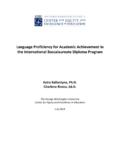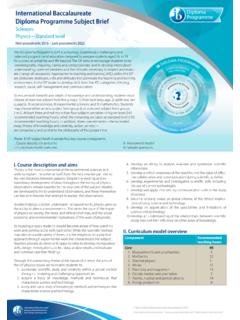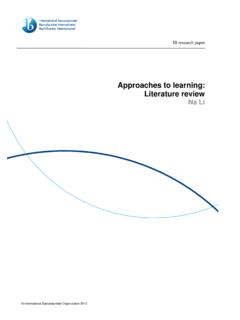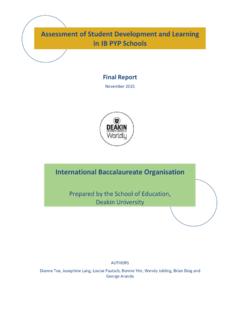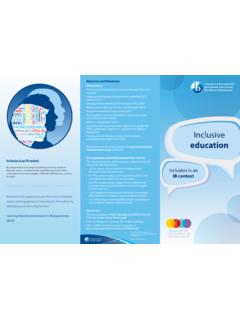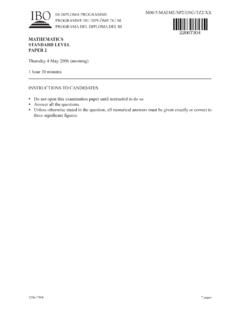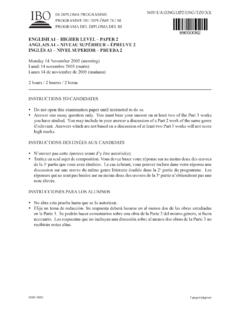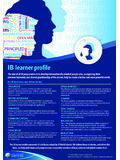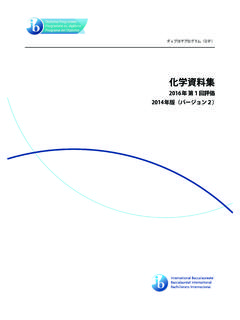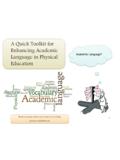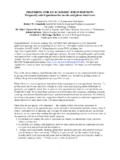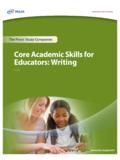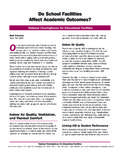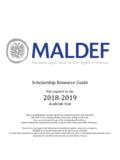Transcription of Academic honesty principles to practice
1 Academic honesty . principles to practice Dr. Celina Garza IB Academic honesty manager IB Assessment Centre - Cardiff Academic honesty /integrity and the IB learner profile IB learners strive to be principled (IB learner profile -revised version August 2013): We act with integrity and honesty , with a strong sense of fairness and justice, and with respect for the dignity and rights of people everywhere. We take responsibility for our actions and their consequences. Understanding Academic honesty The IB upholds principles of Academic honesty , which are seen as a set of values and skills that promote personal integrity and good practice in teaching, learning and assessment. Malpractice vs. Academic misconduct MALPRACTICE. The IB Organization defines malpractice as behaviour that results in, or may result in, the candidate or any other candidate gaining an unfair advantage in one or more assessment components. Academic MISCONDUCT. The IB organization defines Academic misconduct as behaviour (whether deliberate or inadvertent) that results in, or may result in, the candidate or any other candidate gaining an unfair advantage in one or more components of assessment.
2 New plagiarism definition Old text: Plagiarism: this is defined as the representation of the ideas or work of another person as the candidate's own. New text: Plagiarism: this is defined as the representation, intentionally or unwittingly, of the ideas, words or work of another person without proper, clear and explicit acknowledgment. Breaches to IB regulations Plagiarism Collusion Taking unauthorized material into an examination room Stealing examination materials Disruptive behaviour during examination Disclosure of information about the content of an examination paper within 24 hours after a written examination Why is it important to promote Academic honesty ? Because lack of Academic integrity undermines the philosophy of any educational programme. Because intellectual property borders have blurred and students are not clear who owns the information available on the internet. Because students engaging in Academic misconduct miss the learning opportunity.
3 Why is it important to promote Academic honesty ? Because those who breach the regulations of Academic work will find it easy to contravene the conventions in other fields. Because the threat of any form of penalty is not diminishing the amount of Academic misconduct cases. Why cite To show respect for the work of others. To give the reader the opportunity to follow up references. To help a reader to distinguish between the work of the creator and the work of others. To give the reader the opportunity to check the validity of creator's interpretation. To receive proper credit for the research process. To establish credibility and authority of own knowledge and ideas. What to cite Creators are expected to acknowledge any source materials or ideas which are not their own and have been used in any way such as a quotation, paraphrase, or summary. Written or electronic source materials may include: Visual Audio Graphic Lectures Interviews Broadcasts Maps When to cite Citation is expected in the body of the creator's work where the external source has been used.
4 The reader must be able to clearly distinguish between the words/work of the creator and the words/work of others. Including the reference ONLY in the bibliography is not enough. How to cite The IB does not prescribe which style(s) of referencing should be used by candidates; this is left to the discretion of the school. The wide range of subjects, multiple response languages and the diversity of referencing styles makes it impractical and restrictive to insist on particular styles. The IB expects that all candidates: Understand what constitutes Academic misconduct. Know how to conduct research. Know how to acknowledge sources. Know the consequences of being in breach of IB. regulations. Act in a responsible and ethical manner throughout their participation in the Diploma Programme. Promoting Academic honesty at school essentials A school policy on Academic honesty . Calendars for assignments properly planned. Regular meetings with faculty members to verify that all parties have a clear understanding of IB.
5 Expectations. Regular briefings with student's legal guardians. Academic honesty policy key components the IB definitions of breaches to regulations (plagiarism, collusion, etc.). appropriate reference to the IB learner profile. advice on and/or examples of what constitutes Academic misconduct. examples of conventions for citing and acknowledging original authorship. Academic honesty policy key components guidance on the distinction between legitimate collaboration and unacceptable collusion . information on what action will be taken by the IB if a candidate is suspected of being in breach of IB. regulations. an extract from the provisions of the IB regulations relating to Academic misconduct. The school's Academic honesty policy Should be a guiding document that describes how Academic honesty is promoted and observed by the whole school community. Should include the entire school community when developing the policy to achieve a better understanding of its aim.
6 Should live in the classroom and not on the shelf of the school's administration. The role of the head of school Establish an Academic honesty policy. Provide teachers with effective training opportunities. Ensure teachers and students adhere to the school's Academic honesty policy. Share with legal guardians the aim of the Academic honesty policy. Ensure everybody understands Academic honesty and consequences for IB students if they engage in Academic misconduct. The role of programme coordinator Ensure that the school's Academic honesty policy is aligned with IB. expectations and undergoes a periodic review. Ensure that teachers, candidates and legal guardians are aware of IB requirements concerning Academic honesty . Agree with IB teachers an internal calendar of all due dates for the receipt/submission of candidates'. assessment material. Ensure candidates and invigilators are provided with relevant information about examination regulations. The role of the teachers Set clear expectations for assignments and provide guidance to candidates on how to correctly cite the sources they have consulted.
7 Discuss the benefits of submitting assignments that are correctly referenced. Devote time to teach and practice these skills making them second nature . Be a role model - make sure all shared materials (handouts, presentations etc.) are correctly referenced. Design assignments that do not lend themselves to Academic misconduct. Integrated approach to address Academic misconduct: measures Build a supportive learning environment that allow students to receive information BUT also offer guidance to develop Academic writing and study skills. Ensure that teaching strategies put emphasis on authentic tasks. Develop, implement and monitor Academic honesty policies. Ensure that policies and procedures are easily available to all interested parties (teachers, students and their legal guardians). Assessment design to minimize Academic misconduct Design tasks where students have to resort to original scenarios or recent events. Create tasks that include stages where students are requested to document their research.
8 Include methods to ensure that students provide evidence of research process, such as an annotated bibliography. Final remarks All community members of IB World Schools must understand their shared responsibility in upholding Academic honesty and must openly discuss this topic and share good practice . IB students must not follow the easy way out' and engage in Academic misconduct to circumvent the work involved in learning. But they need support from their teachers. Final remarks The majority of students do not intend to plagiarize. Most students realize that citing the sources increases their credibility. Speak regularly with students about this topic; it will serve as reminder and it will develop into a work habit. Discuss the consequences of poor scholarship or Academic dishonesty in the future. Shift the emphasis towards the skills developed while writing, rather than the final product. The principle of Academic honesty should be viewed positively by students and become a natural part of their Academic study.
9 This is not a study skill that is confined to the completion of the IB Diploma Programme; it should remain with IB students throughout higher education and beyond. Additional materials (on IBIS for Diploma Programme coordinators). Short video on Academic honesty for teachers and DP. coordinators (Handbook tab). A promotional pamphlet for DP students and their legal guardians (Library tab). A promotional flyer on Academic honesty for DP students (Library tab). Poster Conduct in the IB examinations' (Library tab). Winning entry of Academic honesty film competition (IB. website). Bibliography (and essential readings). IB publication Academic honesty in the IB educational context IB publication Effective citing and referencing IB General regulations: Diploma Programme Academic honesty in the IB position paper by Jude Caroll Programme standards and practices The Handbook of procedures for the Diploma Programme Images iStockphoto Shutterstock IB owned images
